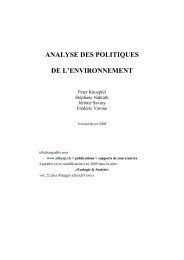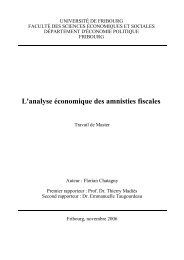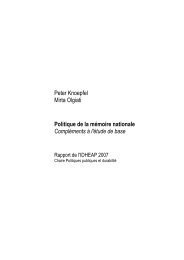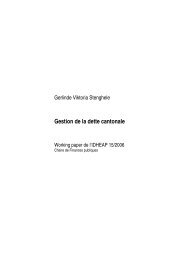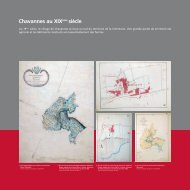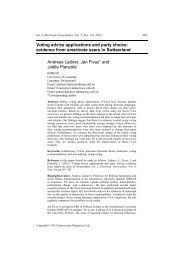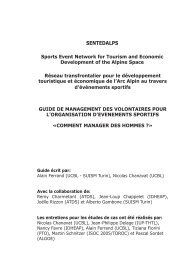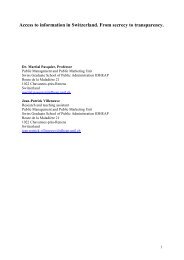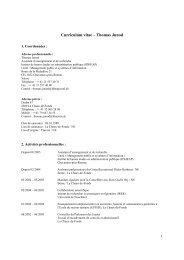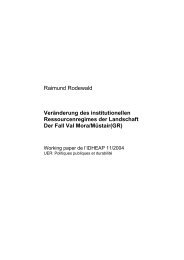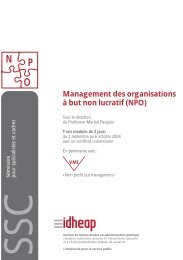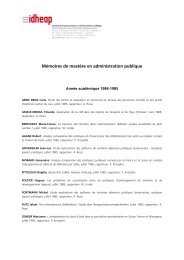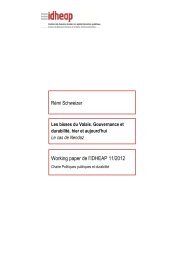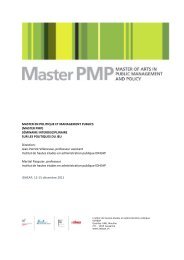Historical Analysis of Institutional Regimes in Switzerland ... - IDHEAP
Historical Analysis of Institutional Regimes in Switzerland ... - IDHEAP
Historical Analysis of Institutional Regimes in Switzerland ... - IDHEAP
You also want an ePaper? Increase the reach of your titles
YUMPU automatically turns print PDFs into web optimized ePapers that Google loves.
Abstract<br />
The <strong>in</strong>creased consumption <strong>of</strong> goods and services based on natural resources have resulted <strong>in</strong><br />
compet<strong>in</strong>g use, <strong>in</strong>creas<strong>in</strong>g scarcity and destruction <strong>of</strong> natural resources. The exploitation and<br />
protection <strong>of</strong> such threatened natural resources can be <strong>in</strong>stitutionally <strong>in</strong>fluenced and managed with the<br />
help <strong>of</strong> <strong>Institutional</strong> Resource <strong>Regimes</strong> (IRs). As we understand it, an IR is a comb<strong>in</strong>ation <strong>of</strong> formal<br />
property, disposition and use rights (= regulative system) and <strong>of</strong> resource-specific protection<br />
policies and/or use policies (= policy design), which comprise specific political aims, <strong>in</strong>struments,<br />
<strong>in</strong>stitutional actor arrangements, target groups and causal and <strong>in</strong>tervention hypothesis.<br />
This Work<strong>in</strong>g Paper exam<strong>in</strong>es if and how IRs adjust to changes <strong>in</strong> the structures <strong>of</strong> users as well as<br />
to <strong>in</strong>creased use <strong>of</strong> natural resources and to scarcity. By compar<strong>in</strong>g the historical development <strong>of</strong> IRs<br />
for five resources (forest, water, land, air and landscape) <strong>in</strong> <strong>Switzerland</strong>, we ga<strong>in</strong> <strong>in</strong>itial <strong>in</strong>sights<br />
<strong>in</strong>to the triggers <strong>of</strong> the emergence and changes <strong>of</strong> IR. It is particularly important to identify the<br />
transition periods, i.e. those historical moments when the IRs actually changed, as well as the entire<br />
development trajectories <strong>of</strong> the IRs for a specific natural resource. Thus, the empirical study<br />
concentrates on the changes <strong>in</strong> the central elements <strong>of</strong> the policy design and property and use rights.<br />
----------------------------------------------------------------------------------------<br />
Résumé<br />
La demande toujours croissante des biens et services qui sont dérivés des ressources naturelles tend<br />
à mettre ces dernières en péril. Af<strong>in</strong> de mieux gérer la rivalité entre les différents usagers d’une<br />
ressource naturelle et d’assurer la pérennité de celle-ci, il faut réfléchir en termes de (nouveaux)<br />
Régimes Institutionnels d’une Ressource (RI). De tels RI se composent, d’une part, des droits de<br />
propriété, de disposition et d’usage (= système régulatif) et, d’autre part, des éléments constitutifs<br />
des politiques publiques d’exploitation et de protection d’une ressource (= design des politiques), à<br />
savoir des objectifs, des <strong>in</strong>struments, des arrangements <strong>in</strong>stitutionnels, des groupes-cibles et des<br />
hypothèses de causalité et d’<strong>in</strong>tervention qui sous-tendent lesdites politiques.<br />
Ce Work<strong>in</strong>g Paper analyse si, et dans quelle mesure, les RI s’adaptent à des changements dans les<br />
structures des usagers de la ressource et, par-là, de la rareté et de la dégradation qui en découlent.<br />
En comparant l’évolution historique des RI pour c<strong>in</strong>q ressources naturelles (forêt, eau, sol, air et<br />
paysage) en Suisse, il est possible d’identifier quelques facteurs favorisant l’émergence et la<br />
transformation des RI. En particulier, il s’agit de se pencher sur les phases de transition des RI a<strong>in</strong>si<br />
que sur leur trajectoire de développement. L’analyse empirique porte par conséquent sur les<br />
changements des droits formant le système régulatif et des éléments constituant le design des<br />
politiques publiques.



